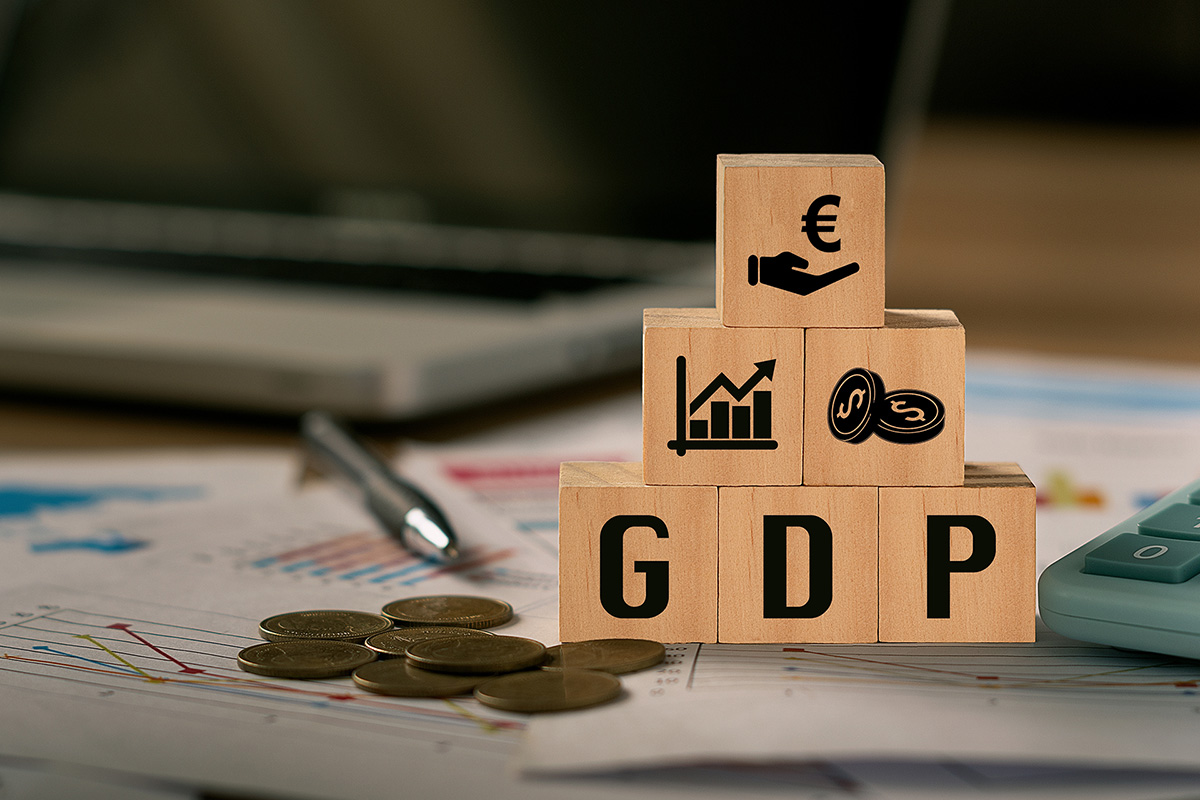

Finance
What Is The GDP Of Greece?
Published: October 28, 2023
Discover the latest figures and analysis on Greece's GDP, a key indicator in the world of finance. Stay informed and make informed financial decisions.
(Many of the links in this article redirect to a specific reviewed product. Your purchase of these products through affiliate links helps to generate commission for LiveWell, at no extra cost. Learn more)
Table of Contents
Introduction
Welcome to the world of finance, where economics and numbers intertwine to shape the global economy. In this ever-changing landscape, understanding key financial indicators is essential, and few are as significant as the Gross Domestic Product (GDP). In this article, we will explore the GDP of Greece, a country that has experienced both triumphs and challenges in its economic journey.
GDP is a crucial measure of a country’s economic health and productivity. It quantifies the total value of all goods and services produced within a nation’s borders over a specific period. By analyzing GDP, economists and policymakers can assess a country’s overall economic performance, identify trends, and make informed decisions.
Greece, located in Southern Europe, is a nation renowned for its rich history, vibrant culture, and stunning landscapes. However, it has also faced significant economic fluctuations over the years. Understanding the GDP of Greece provides valuable insights into the country’s economic state, its challenges, and its potential for growth.
Over the course of this article, we will delve into the intricacies of Greek GDP, exploring its calculation, historical trends, and factors that have influenced it. Additionally, we will compare Greece’s GDP to that of other countries and examine the impact it has on the nation’s economy and society.
By gaining a comprehensive understanding of the GDP of Greece, we can unravel the complexities of its economic landscape and shed light on the steps necessary for sustainable growth and prosperity. So, let’s dive deeper into the fascinating world of Greek GDP and uncover its significance in shaping the country’s economic destiny.
Definition of GDP
Gross Domestic Product (GDP) is a fundamental economic indicator that quantifies the total value of all goods and services produced within a country’s borders during a specific period, typically a year. It is a measure of the economic activity and productivity within a nation, providing valuable insights into its economic health.
GDP includes all final goods and services, both tangible and intangible, produced within a country’s borders. It encompasses a wide range of economic activities, such as manufacturing, agriculture, services, construction, and government spending.
There are three primary approaches to calculating GDP:
- Production approach: This method calculates GDP by adding up the value of goods and services produced in each sector of the economy. It considers factors like labor, capital, and production processes to determine the value added at each stage of production.
- Income approach: This approach focuses on the incomes generated by the production of goods and services. It takes into account employee wages, business profits, rents, and taxes to calculate GDP.
- Expenditure approach: This method calculates GDP by summing up the total spending on goods and services within the economy. It includes consumer spending (household consumption), private investment, government spending, and net exports (exports minus imports).
GDP serves as a crucial metric for economists, policymakers, and investors. It provides valuable insights into the overall strength of an economy, its growth rate, and its level of development. By analyzing GDP, experts can assess economic trends, identify areas of strength or weakness, and make informed decisions regarding fiscal policies, investments, and resource allocations.
While GDP is a widely used measure of economic activity, it does have limitations. For example, it does not account for income distribution, quality of life indicators, and the underground economy. Additionally, GDP alone does not provide a complete picture of a nation’s overall well-being or sustainability. Therefore, it is often measured alongside other indicators, such as the Human Development Index (HDI) or the Genuine Progress Indicator (GPI), to offer a more holistic view of an economy and its societal impact.
Importance of GDP
Gross Domestic Product (GDP) plays a crucial role in evaluating the performance and health of an economy. It serves as a comprehensive measure of a nation’s economic activity and provides valuable insights into its overall productivity and growth. Here are several reasons why GDP is of utmost importance:
- Economic Growth: GDP allows policymakers and economists to assess the rate of economic growth within a country. By analyzing GDP over time, they can identify patterns, trends, and potential areas for improvement. High and sustainable GDP growth is indicative of a thriving economy, providing better employment opportunities, increased income levels, and higher standards of living for its citizens.
- Investment Decision-making: GDP is a key consideration for investors when making decisions about allocating resources. Investors often look for countries with strong and growing GDP, as it indicates a favorable business environment and potential for profitability. GDP data helps investors assess market opportunities and risks, influencing investment decisions at both domestic and international levels.
- Fiscal and Monetary Policy: Governments rely on GDP data to formulate and implement fiscal and monetary policies. By monitoring GDP growth and fluctuations, policymakers can adjust tax rates, government spending, interest rates, and money supply to maintain stability and stimulate economic growth. GDP data is crucial for optimizing resource allocation, reducing unemployment rates, and managing inflation.
- International Comparisons: GDP enables meaningful comparisons of economic performance between countries. It allows policymakers and economists to gauge a country’s standing relative to its peers and identify areas of strength or weakness. International organizations, such as the World Bank and the International Monetary Fund, rely on GDP data to assess the economic well-being of nations and provide financial assistance or policy recommendations where necessary.
- Social Welfare: While GDP does not solely define well-being, it is closely correlated with several socio-economic factors, such as education, healthcare, and infrastructure development. Higher GDP generally allows governments to invest more in social programs aiming to improve the quality of life for their citizens. Therefore, tracking GDP growth is important in ensuring the well-being and progress of society.
Despite its importance, it is essential to recognize the limitations of GDP as a sole measure of economic and social progress. It does not account for income distribution disparities, environmental sustainability, or factors affecting overall well-being. To gain a comprehensive understanding, policymakers and researchers often analyze GDP alongside other indicators to develop more holistic policies that address societal needs and promote sustainable development.
Overview of Greek Economy
The Greek economy, situated in Southern Europe, has a rich and storied history that dates back centuries. It has experienced periods of prosperity and faced several economic challenges over the years. Understanding the current state of the Greek economy provides valuable insights into its strengths, weaknesses, and potential for growth.
Historically, Greece’s economy relied heavily on agriculture, shipping, and tourism. However, in recent decades, there has been a shift towards a more diversified economy, with sectors such as manufacturing, services, and technology gaining prominence. Today, the Greek economy is a mix of traditional industries and emerging sectors.
Despite a challenging economic climate in recent years, the Greek economy has shown signs of recovery. Following a severe economic crisis and a series of austerity measures, Greece has implemented structural reforms aimed at enhancing competitiveness, attracting investment, and fostering economic growth. These reforms have helped to stabilize the economy and restore confidence in the financial markets.
Tourism is a vital sector in Greece, contributing significantly to the economy. The country’s rich cultural heritage, stunning landscapes, and beautiful islands attract millions of tourists each year. Tourism generates revenue, creates job opportunities, and boosts other sectors such as hospitality, transportation, and retail.
Greece also has a strong maritime sector and is one of the largest shipping nations globally. Greek-owned shipping companies operate a significant portion of the world’s merchant fleet. This sector brings in substantial foreign exchange earnings and plays a crucial role in international trade and transportation.
In recent years, Greece has made efforts to develop its technology and innovation sector. Startups and tech companies have emerged, focusing on areas such as software development, telecommunications, and digital services. This diversification aligns with global trends and positions Greece as a hub for innovation and entrepreneurship.
However, the Greek economy still faces challenges. High unemployment rates, particularly among youth, and a considerable public debt burden continue to be significant concerns. Building a resilient and sustainable economy requires further investment in education, infrastructure, and job creation.
The Greek government, in collaboration with international organizations, continues to work towards promoting economic stability, attracting foreign investment, and fostering sustainable growth. By leveraging its strengths, addressing its challenges, and embracing innovation, the Greek economy has the potential to thrive and regain its position as a dynamic player in the global market.
Calculation of Greek GDP
The calculation of Gross Domestic Product (GDP) for Greece follows the same principles as those applied to other countries. The GDP of Greece is derived by measuring the total value of goods and services produced within the country’s borders over a specific period, typically a year.
There are three primary approaches to calculating GDP, which also apply to Greece:
- The Production Approach: This method involves adding up the value of all goods and services produced in each sector of the economy. It includes sectors such as agriculture, manufacturing, services, and construction. The value added at each stage of production is calculated, taking into account factors like labor, capital, and production processes.
- The Income Approach: This approach focuses on the incomes generated by the production of goods and services. It includes employee wages, business profits, rents, and taxes. By summing up the various income components, economists can estimate the GDP.
- The Expenditure Approach: This method calculates GDP by adding up the total spending on goods and services within the economy. It includes consumer spending (household consumption), private investment, government spending, and net exports (exports minus imports). This approach provides insights into the demand side of the economy.
For Greece, these three approaches are used in combination to ensure a comprehensive measurement of GDP. The data necessary for the calculation of Greek GDP is collected from various sources, including surveys, administrative records, and financial statements.
The Hellenic Statistical Authority (ELSTAT) is responsible for collecting and analyzing the necessary data to estimate Greece’s GDP accurately. National accountants, economists, and statisticians work together to compile the relevant information from different sectors of the economy.
Once the data is collected, it undergoes a meticulous process of compilation and analysis. It involves adjusting for factors such as inflation, seasonal variations, and changes in the composition of the economy. Additionally, any estimations and assumptions made during the process are carefully documented and subject to review and scrutiny.
The final GDP figure for Greece is reported periodically, allowing policymakers, economists, and investors to monitor the health and performance of the Greek economy. It serves as a vital metric for making informed decisions, formulating policies, and assessing the economic progress of the country.
Calculation of Greek GDP is a complex and dynamic process that requires accurate data collection, rigorous analysis, and adherence to international standards. By continuously improving methodologies and ensuring the accuracy of data, Greece can obtain a reliable measurement of its GDP and make informed strategic decisions to foster economic growth and stability.
Historical GDP of Greece
The historical GDP of Greece provides us with a glimpse into the country’s economic journey, showcasing its highs, lows, and the challenges it has faced over time. Greece has experienced periods of economic growth, setbacks, and resilience throughout its history.
During the mid-20th century, Greece’s GDP experienced steady growth, driven mainly by agricultural production and increased industrialization. However, political instability and economic disruptions, such as World War II and the Greek Civil War, hindered progress during this period.
In the 1960s and 1970s, Greece witnessed a growth spurt, fueled by investments in infrastructure, tourism, and manufacturing. The country’s strategic location, beautiful landscapes, and rich cultural heritage made it an attractive destination for tourism, contributing significantly to its GDP.
However, Greece faced economic challenges in the late 20th century. High inflation, rising public debt, and a heavy reliance on borrowing led to economic instability and limited growth. These issues culminated in a severe economic crisis in the late 2000s, which had a profound impact on the country’s GDP.
During the economic crisis, Greece implemented austerity measures to address its debt crisis and restore economic stability. These measures included fiscal consolidation, structural reforms, and external financial assistance. The crisis resulted in a significant contraction of GDP, a rise in unemployment rates, and decreased consumer spending.
In recent years, Greece has shown signs of recovery. Implementing structural reforms, attracting foreign investment, and focusing on sectors such as tourism, shipping, and technology has contributed to a gradual rebound in the Greek economy. However, the impact of the economic crisis still lingers, and challenges such as high public debt and unemployment rates persist.
It is important to note that GDP figures can vary from year to year, reflecting the impact of global economic conditions, domestic policies, and the performance of different sectors. Periodic fluctuations in the GDP of Greece are not uncommon, and it is crucial to analyze long-term trends to gain a comprehensive understanding of the country’s economic growth trajectory.
Despite the challenges faced, Greece’s historical GDP showcases the resilience and potential for growth within the Greek economy. By leveraging its strengths, implementing sustainable policies, and fostering innovation, Greece has the opportunity to build a more robust and prosperous economy for the future.
Factors Affecting Greek GDP
Greece’s Gross Domestic Product (GDP) is influenced by a variety of factors that shape the country’s economic performance. Understanding these factors is essential for analyzing the current state of the Greek economy and predicting future trends. Here are some key factors that have an impact on Greek GDP:
- Economic Policies: The economic policies implemented by the Greek government play a significant role in shaping GDP. Policies related to fiscal management, taxation, regulation, and investment incentives can either promote or hinder economic growth.
- Global Economic Conditions: Greece’s GDP is influenced by global economic trends and conditions. Factors such as international trade, financial market fluctuations, and geopolitical events can impact Greece’s export market, foreign direct investment, and overall economic stability.
- Investment and Business Climate: The level of domestic and foreign investment, as well as the ease of doing business, can impact Greek GDP. Favorable investment conditions, including a transparent regulatory framework, efficient infrastructure, and access to funding, can attract more investment and contribute to economic growth.
- Tourism: Tourism is a significant sector in Greece and plays a vital role in GDP growth. Factors such as political stability, cultural attractions, hospitality infrastructure, and marketing efforts impact the number of tourists visiting Greece each year. The performance of the tourism sector directly influences GDP through spending on accommodations, dining, transportation, and other tourism-related services.
- Exports and Imports: Greece’s balance of trade, determined by the difference between exports and imports, affects GDP. The competitiveness of Greek industries, fluctuations in global demand for Greek products, exchange rates, and trade agreements all play a role in shaping the country’s net exports and overall economic performance.
- Labor Market: The labor market dynamics, including employment levels, wages, and productivity, impact Greek GDP. Higher employment rates and productivity contribute to increased economic output, while wage levels impact consumer spending and domestic demand.
- Government Debt and Fiscal Policy: The level of government debt and fiscal policies can affect Greek GDP. High levels of public debt can lead to higher interest payments, reduced public investment, and limited fiscal flexibility, thus impacting economic growth. Effective fiscal management, including responsible debt management and targeted government spending, is crucial for sustainable growth.
- Infrastructure Development: The quality and availability of infrastructure, such as transportation networks, energy supply, and telecommunications, affect economic productivity and competitiveness. Adequate infrastructure boosts efficiency, facilitates trade, and attracts investment, positively impacting Greek GDP.
These are just some of the key factors that influence the GDP of Greece. The interplay between these factors, along with other microeconomic and macroeconomic variables, shapes the overall economic performance of the country. Understanding and managing these factors effectively is essential for promoting sustainable economic growth and stability in Greece.
Comparison of Greek GDP with Other Countries
Comparing the Gross Domestic Product (GDP) of Greece with that of other countries provides valuable insights into its economic standing and global competitiveness. Here, we examine how Greece’s GDP measures up to that of some notable nations, both within the European Union (EU) and globally.
Within the EU, Greece’s GDP is smaller compared to economic powerhouses such as Germany, France, and the United Kingdom. These countries have larger economies, higher levels of industrialization, and diversified sectors contributing to their GDP. Greece’s economy has historically relied on sectors like tourism, shipping, and agriculture.
However, it is important to highlight that when comparing GDP figures, it is essential to consider not only the size of the economy but also its population. Greece has a smaller population compared to countries like Germany and France, which can influence GDP per capita figures.
Considering its neighbors in Southern Europe, Greece’s GDP is comparable to that of Portugal and is higher than countries like Bulgaria and Romania. These countries have similar economic structures and face comparable challenges, such as high debt levels and a need for economic reforms.
Globally, Greece’s GDP is modest compared to countries like the United States, China, and Japan, which have the largest economies in the world. These countries benefit from large populations, extensive industrial sectors, and robust international trade relationships.
It is crucial to note that GDP figures can fluctuate over time due to various factors, including economic performance, government policies, and global economic conditions. Greece, for instance, faced a severe economic crisis in the late 2000s, which resulted in a significant contraction of its GDP. However, the country has made efforts towards recovery, implementing structural reforms and attracting investment.
Comparing GDP figures provides insights into the relative economic strength and competitiveness of countries. However, it is equally important to consider other dimensions, such as human development indicators, income inequality, and overall well-being, to gain a more comprehensive understanding of a nation’s economic and societal progress.
Ultimately, while Greece’s GDP may not match that of larger economies, the country has unique strengths and opportunities. By focusing on sectors with growth potential, implementing effective economic policies, and fostering innovation, Greece can continue to improve its economic standing and pursue sustainable development for the future.
Impacts of Greek GDP on Economy and Society
The Gross Domestic Product (GDP) of Greece has significant impacts on both the economy and society. These impacts reflect the overall health and performance of the Greek economy and extend to various aspects of daily life. Here are some of the key impacts of Greek GDP:
- Economic Growth: Greek GDP serves as a barometer for economic growth. A higher GDP indicates increased economic activity, job creation, and investment opportunities. It stimulates various sectors of the economy, leading to improved living standards, higher income levels, and enhanced economic opportunities for individuals and businesses.
- Employment: Greek GDP has direct implications for employment rates. As the economy grows, businesses expand, leading to more job opportunities for the workforce. A robust GDP provides a favorable environment for job seekers, reduces unemployment rates, and contributes to socio-economic stability. Reduced unemployment, in turn, leads to increased consumer spending, further fueling economic growth.
- Tax Revenues: Greek GDP plays a crucial role in generating tax revenues for the government. As GDP increases, tax revenues tend to rise, providing the government with resources to fund public infrastructure, education, healthcare, and social welfare programs. Higher tax revenues help create a stable fiscal environment, allowing for investments in the country’s future development.
- Government Spending: The level of Greek GDP influences the government’s ability to spend on public goods and services. A higher GDP enables the government to allocate more resources to sectors such as healthcare, education, transportation, and social welfare. Strong GDP growth provides the government with greater flexibility in implementing policies aimed at improving the well-being of its citizens.
- Standard of Living: Greek GDP has a direct impact on the standard of living of its citizens. A higher GDP supports increased income levels, which, in turn, allow individuals to afford better housing, healthcare, education, and overall quality of life. The availability of goods and services, healthcare facilities, and public infrastructure are all influenced by the strength of the economy as measured by GDP.
- Investment and Business Opportunities: A robust Greek GDP fosters a favorable environment for both domestic and foreign investment. A growing economy indicates a vibrant market, increased demand for goods and services, and potential for profitability. Higher GDP attracts businesses, stimulates entrepreneurship, and promotes innovation, creating a cycle of economic growth and prosperity.
It is important to note that while GDP is an essential indicator, it is not the sole determinant of the overall well-being of a society. Additional factors, such as income distribution, social inequalities, and environmental sustainability, should also be considered to create a holistic understanding of the impacts of Greek GDP on the economy and society.
By striving for sustainable economic growth, addressing societal needs, and ensuring inclusive development, Greece can harness the positive impacts of its GDP to create a prosperous future for its citizens and achieve long-term economic and social progress.
Conclusion
The Gross Domestic Product (GDP) of Greece serves as a vital measure of the country’s economic health and productivity. As we have explored throughout this article, understanding Greek GDP provides valuable insights into the nation’s economic journey, challenges, and potential for growth.
Greece has a diverse economy, with sectors like tourism, shipping, and agriculture contributing significantly to its GDP. While the country has faced economic setbacks, such as the severe crisis in the late 2000s, efforts to stabilize the economy and implement structural reforms have shown signs of recovery.
Greek GDP is influenced by various factors, including economic policies, global economic conditions, investment climate, tourism, exports, labor market dynamics, government debt, and infrastructure development. These factors shape the country’s economic performance and have direct impacts on the economy and society.
The impacts of Greek GDP extend to economic growth, employment, tax revenues, government spending, the standard of living, investment opportunities, and overall socio-economic stability. A robust GDP creates a favorable environment for businesses to thrive, fosters job creation, improves living standards, and provides resources for government investments in public goods and services.
While comparing Greek GDP to other countries offers insights into its economic standing, it is crucial to consider broader dimensions of development, encompassing social factors, income inequalities, and sustainability. By focusing on sustainable growth, addressing societal needs, and encouraging innovation, Greece can capitalize on its unique strengths and continue to build a resilient and prosperous economy.
In conclusion, the GDP of Greece serves as a critical tool for policymakers, economists, and investors to understand the country’s economic performance and make informed decisions. By leveraging the impacts of Greek GDP, Greece can navigate towards a path of sustainable development, ensuring the well-being and prosperity of its people in the years to come.














